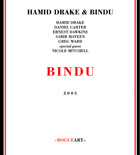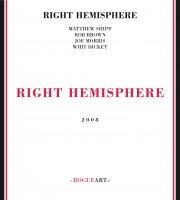Home » Jazz Articles » Record Label Profile » RogueArt
RogueArt
'RogueArt' is a natural name for a label that provides shelter for music that is outside the mainstream.
—Michel Dorbon, Rogue Art founder
 Flag-waving and nationalism likely have nothing to do with the bold cover design used by the French record label RogueArt, but the stripes do still suggest a parallel. Rogue's distinctive white covers, with stripes and basic text in black and red, are a proud announcement of intent and if the flags of the two countries suggest a kinship, the label too shows a devotion to the United States. RogueArt had an auspicious beginning in 2005 with the release of percussionist Hamid Drake's first album as a leader and has since released 14 more—by and large major releases by major innovators in American jazz.
Flag-waving and nationalism likely have nothing to do with the bold cover design used by the French record label RogueArt, but the stripes do still suggest a parallel. Rogue's distinctive white covers, with stripes and basic text in black and red, are a proud announcement of intent and if the flags of the two countries suggest a kinship, the label too shows a devotion to the United States. RogueArt had an auspicious beginning in 2005 with the release of percussionist Hamid Drake's first album as a leader and has since released 14 more—by and large major releases by major innovators in American jazz."My personal opinion is that most CDs don't have a nice look," Rogue founder Michel Dorbon said of the distinctive cover design. "I wanted the RogueArt layout to be original, sober, noticeable and beautiful. I asked the great artist Max Schoendorff to propose something. Max came back to me few weeks later with a design. I didn't change anything about it. A recording of music cannot be just an electronic file; it has to be an object that music lovers want to keep."
The Rogue catalog does include some European names. An excellent 2007 set featuring two DVDs and one CD by the late German bassist Peter Kowald (including the excellent 2001 documentary Off the Road) was a welcome release and upcoming titles include two French players: flutist Michel Edelin and bassist Joelle Leandre. But for the most part, the label has reflected Dorbon's own love for American, and particularly New York, jazz.
 Dorbon first came into contact with free jazz in the '70s at an Archie Shepp concert. At the time he was a fan of rock bands that incorporated improvisation: Henry Cow, Soft Machine and Cream. The Shepp show hooked him. He spent the next two decades exploring the music before finding himself on the business end. By the '90s, he was producing records for the French label Bleu Regard by Matthew Shipp, Rob Brown, Sabir Mateen and Cosmosamatics but—perhaps with a bit of his own revolutionary spirit—soon found himself wanting more autonomy.
Dorbon first came into contact with free jazz in the '70s at an Archie Shepp concert. At the time he was a fan of rock bands that incorporated improvisation: Henry Cow, Soft Machine and Cream. The Shepp show hooked him. He spent the next two decades exploring the music before finding himself on the business end. By the '90s, he was producing records for the French label Bleu Regard by Matthew Shipp, Rob Brown, Sabir Mateen and Cosmosamatics but—perhaps with a bit of his own revolutionary spirit—soon found himself wanting more autonomy."To produce without a label, however, is a bit frustrating," he said. "I decided to start my own label to have more freedom, more space."
"When I decided to make my first production for Bleu Regard, I wanted a project with Matthew Shipp, who I had heard in the Davis S. Ware Quartet and solo," he said. "It was my first direct contact with musicians from New York. The project proposed by Matthew included Rob Brown and William Parker.
Little by little, I started to know other musicians and the musicians started to know me, to know my way of working. New York is definitely a place where a lot of things happen for this music and it's difficult to be involved in this music and ignore New York. I work also regularly with Chicago musicians such as Roscoe Mitchell and Hamid Drake, who I was introduced to by poet Alexandre Pierrepont. Chicago is another very interesting place with a lot of young and great musicians."
 While many labels are content with the latest live session or one-off meeting by a group of players, Rogue releases seem infused with intent. Mitchell's Turu, with Corey Wilkes, Craig Taborn, Tani Tabal and Jaribu Shahid, links his Note Factory to the new lineup of the Art Ensemble of Chicago. Rob Brown's Radiant Pools and Steve Swell's Swimming in a Galaxy of Goodwill and Sorrow present well-honed but underdocumented groups with long associations among their members. And Shipp's Salute to 100001 Stars and Parker's Alphaville Suite find inspiration in the work of French writer Jean Genet and filmmaker Jean Luc Godard respectively.
While many labels are content with the latest live session or one-off meeting by a group of players, Rogue releases seem infused with intent. Mitchell's Turu, with Corey Wilkes, Craig Taborn, Tani Tabal and Jaribu Shahid, links his Note Factory to the new lineup of the Art Ensemble of Chicago. Rob Brown's Radiant Pools and Steve Swell's Swimming in a Galaxy of Goodwill and Sorrow present well-honed but underdocumented groups with long associations among their members. And Shipp's Salute to 100001 Stars and Parker's Alphaville Suite find inspiration in the work of French writer Jean Genet and filmmaker Jean Luc Godard respectively.Perhaps the nicest surprises to come out under the Rogue flag have been the two Drake releases. Both feature fluid mixes of jazz and improv with African- and Arabic-tinged playing and set vocals against an array of great musicians. Dorbon said he worked extensively with Drake to create a strong premiere for the percussionist as bandleader.
 "The shape of the band changed a couple of times from our first talk to the recording," he said. "Hamid started with a proposal, we spoke, he come back with a slightly modified proposal, we spoke again...it can last weeks and months like that up to the recording. We have already started this process for a third CD. I want to be sure that Hamid arrives at the band he feels comfortable with before we start recording."
"The shape of the band changed a couple of times from our first talk to the recording," he said. "Hamid started with a proposal, we spoke, he come back with a slightly modified proposal, we spoke again...it can last weeks and months like that up to the recording. We have already started this process for a third CD. I want to be sure that Hamid arrives at the band he feels comfortable with before we start recording."RogueArt has also moved outside the realm of audio releases. A second DVD is in the works, with Mitchell and electronic music composer David Wessel and the first book bearing the imprint was just released. Logos and Language: A Post-Jazz Metaphorical Dialogue is a collection of writings by and between Shipp and poet Steve Dalachinsky. A second book by Dalachinsky and photographer Jacques Bisceglia is already in the works, as well as new recordings by a trio of Larry Ochs, Miya Masaoka and Peggy Lee, a big band led by Pierrepont and Mike Ladd and Edelin's trio with guest Steve Lehman.
All of whom could qualify—must, presumably, by their categorization—as "rogue artists." The word refers to a vagrant or dishonest person, but could also refer to the members of the British colonies rebelling against King George or the leaders of the French revolution or the organizers of the Underground Railroad. Or perhaps simply those committed to their art despite the dictates of the market.
"Jazz is not only the music of African Americans," Dorbon said. "It is the music of any people who had to struggle to be themselves, to free themselves. It is not by chance that a gypsy who lived in France, Django Reinhardt, selected jazz as a means of expression. It is not by chance that jazz welcomed the gypsy musicians. In a certain way, all the musicians who selected jazz to tell what they have to say, wherever they originally came from, never found a place in the economic and political systems imposed on them. 'RogueArt' is a natural name for a label that provides shelter for music that is outside the mainstream."
< Previous
Strange Toys
Next >
Percussion Ensemble
Comments
Tags
For the Love of Jazz
 All About Jazz has been a pillar of jazz since 1995, championing it as an art form and, more importantly, supporting the musicians who create it. Our enduring commitment has made "AAJ" one of the most culturally important websites of its kind, read by hundreds of thousands of fans, musicians and industry figures every month.
All About Jazz has been a pillar of jazz since 1995, championing it as an art form and, more importantly, supporting the musicians who create it. Our enduring commitment has made "AAJ" one of the most culturally important websites of its kind, read by hundreds of thousands of fans, musicians and industry figures every month.






















